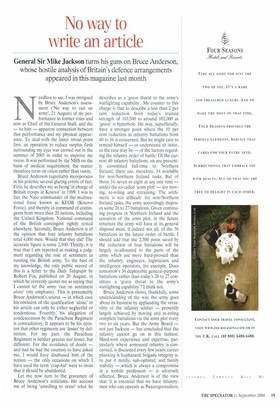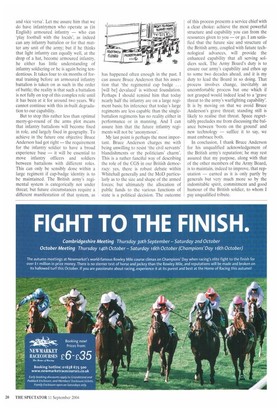No way to write an article
General Sir Mike Jackson turns his guns on Bruce Anderson, whose hostile analysis of Britain's defence arrangements appeared in this magazine last month
Needless to say, I was intrigued by Bruce Anderson's assessment (No way to run an army', 21 August) of my performance in former roles and now as Chief of the General Staff, and the — to him — apparent connection between that performance and my physical appearance. To deal with the latter trivial point first: an operation to reduce surplus flesh surrounding my eyes was carried out in the summer of 2003 in order to improve my vision. It was performed by the NHS on the basis of medical requirement; the matter therefore turns on vision rather than vanity.
Bruce Anderson regrettably incorporates in his polemic several glaring errors of fact, First, he describes me as being 'in charge of British troops in Kosovo' in 1999. I was in fact the Nato commander of the multinational force known as KFOR (Kosovo Force), and thereby in command of contingents from more than 20 nations, including the United Kingdom. National command of the British contingent rightly rested elsewhere. Secondly, Bruce Anderson is of the opinion that four infantry battalions total 4,000 men. Would that they did! The accurate figure is some 2,500. Thirdly, it is true that I am reported as making a judgment regarding the role of sentiment in running the British army. To the best of my knowledge, the only public record of this is a letter to the Daily Telegraph by Robert Fox, published on 20 August, in which he correctly quotes me as saying that I cannot let the army 'run on sentiment alone' (my emphasis), This is presumably Bruce Anderson's source — in which case his omission of the qualification 'alone' in his article can only be either neglectful or tendentious. Fourthly, his allegation of condescension by the Parachute Regiment is contradictory. It appears to be his opinion that other regiments are 'lesser' by definition. For my part, the Parachute Regiment is neither greater nor lesser, but different. For the avoidance of doubt — and had he had the courtesy to have asked me, I would have disabused him of the notion — the only occasions on which I have used the term 'crap-hat' were to insist that it should be abandoned.
Let me now turn to the gravamen of Bruce Anderson's criticisms. He accuses me of being 'unwilling to resist' what he describes as a 'grave threat to the army's warfighting capability'. My counter to this charge is that to describe a less than 2 per cent reduction from today's trained strength of 103,500 to around 102,000 as 'grave' is hyperbole. He may, superficially, have a stronger point where the 10 per cent reduction in infantry battalions from 40 to 36 is concerned. But he might care to remind himself — or understand ab initio, as the case may be — of the factors regarding the infantry order of battle. Of the current 40 infantry battalions, six are presently committed full-time to Northern Ireland; there are, therefore, 34 available for non-Northern Ireland tasks, But of those 34, seven or eight at any one time — under the so-called 'arms plot' — are moving, re-roling and retraining. The arithmetic is not difficult: for non-Northern Ireland tasks, the army accordingly disposes some 26 to 27 battalions. Given continuing progress in Northern Ireland and the cessation of the arms plot, in the future structure the army will have at its general disposal most, if indeed not all, of the 36 battalions in the future order of battle. I should add that the 2,500 posts saved by the reduction of four battalions will be largely re-allocated to the parts of the army which are more hard-pressed than the infantry: engineers, logisticians and intelligence operators, for example. Does tomorrow's 36 deployable general-purpose battalions rather than today's 26 to 27 constitute a 'grave threat to the army's warfighting capability'? I think not.
Bruce Anderson shows, thankfully, some understanding of the way the army goes about its business by applauding the versatility of the infantry soldier — presently largely achieved by moving and re-roling complete battalions via the arms plot every two to six years. But the Army Board — not just Jackson — has concluded that the infantry cannot go on in this fashion. Hard-won experience and expertise, particularly where armoured infantry is concerned, is discarded every few years; career planning is haphazard; brigade integrity is, to put it mildly, sub-optimal; and family stability — which is always a compromise in a mobile profession — is adversely affected. Bruce Anderson is of the view that 'it is essential that we have infantrymen who can operate as Panzergrenadiers.
and vice versa'. Let me assure him that we do have infantrymen who operate as (in English) armoured infantry — who can 'play football with the locals', as indeed can any infantry battalion or for that matter any unit of the army; but if he thinks that light infantry can equally well, at the drop of a hat, become armoured infantry, he either has little understanding of infantry soldiering or he is again being tendentious. It takes four to six months of formal training before an armoured infantry battalion is taken on as such in the order of battle; the reality is that such a battalion is not fully on top of this complex role until it has been at it for around two years. We cannot continue with this in-built degradation to our capability.
But to stop this rather less than optimal merry-go-round of the arms plot means that infantry battalions will become fixed in role, and largely fixed in geography. To achieve in the future one objective Bruce Anderson had got right — the requirement for the infantry soldier to have a broad experience base — it will be essential to move infantry officers and soldiers between battalions with different roles. This can only be sensibly done within a large regiment if cap-badge identity is to be maintained. The British army's regimental system is categorically not under threat; but future circumstances require a different manifestation of that system, as has happened often enough in the past. I can assure Bruce Anderson that his assertion that 'the regimental cap badge ... [will be] devalued' is without foundation. Perhaps I should remind him that today nearly half the infantry are on a large regiment basis; his inference that today's large regiments are less capable than the singlebattalion regiments has no reality either in performance or in manning. And I can assure him that the future infantry regiments will not be 'anonymous'.
My last point is perhaps the most important. Bruce Anderson charges me with being unwilling to resist 'the civil servants' blandishments or the politicians' charm'. This is a rather fanciful way of describing the role of the CGS in our British democracy: yes, there is robust debate within Whitehall generally and the MoD particularly as to the size and shape of the armed forces; but ultimately the allocation of public funds to the various functions of state is a political decision. The outcome of this process presents a service chief with a clear choice: achieve the most powerful structure and capability you can from the resources given to you — or go. I am satisfied that the future size and structure of the British army, coupled with future technological advances, will provide the enhanced capability that all serving soldiers seek. The Army Board's duty is to ensure our army's capability and ethos up to some two decades ahead, and it is my duty to lead the Board in so doing. That process involves change, inevitably an uncomfortable process but one which if not grasped would indeed lead to a 'grave threat to the army's warfighting capability'. It is by moving on that we avoid Bruce Anderson's grave threat; standing still is likely to realise that threat. Space regrettably precludes me from discussing the balance between 'boots on the ground' and new technology — suffice it to say, we must embrace both.
In conclusion, I thank Bruce Anderson for his unqualified acknowledgement of the British army's reputation; he may rest assured that my purpose, along with that of the other members of the Army Board, is to maintain, indeed to improve, that reputation — earned as it is only partly by generals but very much more so by the indomitable spirit, commitment and good humour of the British soldier, to whom I pay unqualified tribute.











































































 Previous page
Previous page